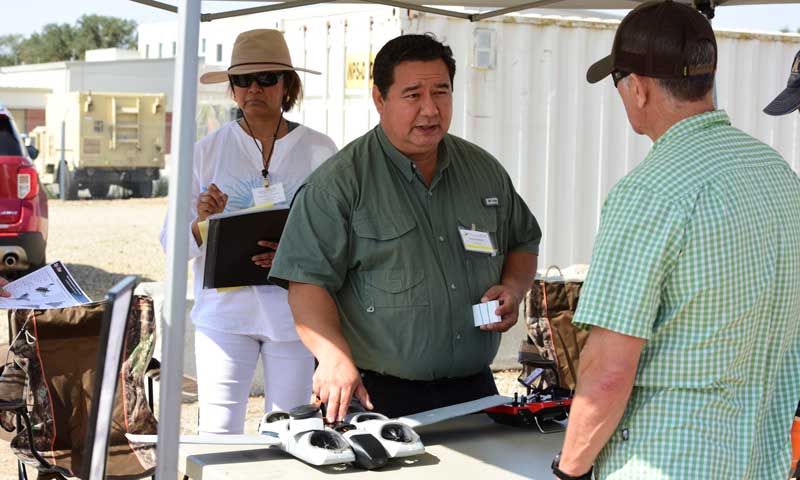The Naval Postgraduate School (NPS) held the latest iteration of its Joint Interagency Field Experimentation (JIFX) 21-4 event, August 23-27, with experimentation taking place at the NPS Field Lab at Camp Roberts and the recently added Sea Land Air Military Research Initiative (SLAMR) Laboratory across the street from the NPS campus. The quarterly event focuses on collaboration between military, commercial industry, and academia to experiment with and evaluate emerging technologies for defense-related applications.
During the week-long event, a total of 247 registered participants, including 84 experimenters representing 19 unique organizations, 40 DOD stakeholders, and 51 NPS students representing multiple service branches along with international students from Brazil, Greece, Indonesia and Sweden, took part in observing and evaluating the technologies.
"The program brings together a really diverse group of people to conduct research," said JIFX Director Michael Richardson, a retired Army Special Forces officer. "We can support field experimentation across the physical, electromagnetic, and cyber domains, but at this point in time, the JIFX team has expertise in enabling experimentation on autonomous systems and communications networking between those systems."
Whether a JIFX veteran or a first-time attendee, JIFX strives to create connections that foster the collaborative spirit amongst those with a curious mind and provide an opportunity to gain first-hand knowledge of what various entities can offer to create effective solutions.
For someone like first-time JIFX participant Chief Executive Officer of Craitor Eric Shnell, JIFX offers a unique opportunity to test his 3D printing capability in a rugged environment. Already in collaboration with the U.S. Marine Corps, Craitor is trying to revolutionize the DoD supply chain by making a truly expeditionary high-temperature 3D printer that can manufacture high-grade parts anywhere.
"JIFX provides a community of very like-minded, technology-driven experimenters," said Shnell. "We all understand what we're working towards to be able to build the solution. Not only do we understand more from stakeholders as we talk to the government side, but also the industry side and being able to develop even more solutions out of just a few days, once a quarter."
JIFX also provides NPS students and faculty a distinct opportunity to see relevant research and technology that directly relates to their work at the university in a field environment while giving them a chance to integrate field-experimentation into their own research efforts.
"What JIFX gives me is the ability to see the experiments in action and the new technology being produced for the DOD," said NPS student U.S. Navy Lt. Mario Medina. "It directly aligns with my thesis work, which is maritime, to bring awareness of dark target threats off the California coastline. This gives me a better idea of the technology that could be used in my thesis program and toward my overall degree program, which in return will benefit the Navy, Coast Guard and Marine Corps to better understand maritime domain awareness."
"What we're trying to do is offer this uniquely militarily relevant educational experience that connects the next generation, emerging technology to the officers that will be using those in support of military missions in the future," added SLAMR Director Dr. Raymond Buettner.
Within the past year, experimentation conducted at JIFX 21-2 enabled two NPS students to complete field experimenters in their thesis work exploring radio frequency manipulation, which laid the foundation for the Marine Corps Warfighting Lab to conduct more extensive research to mitigate current and projected threats in the electro-magnetic spectrum.
"JIFX can really enable career military leaders to advance and optimize their time while they're at the school and to provide outcomes of great value to the force," said Richardson. "NPS really doubles the investment that the service makes with the leaders that they send to study with us. The services give the leaders this opportunity to grow as individual leaders and to return to the force as functional experts in the field of their studies. They're more intellectually primed when they return to their roles and they are leaders in addressing the opportunities and challenges posed by the emerging operational environment."
Richardson noted that JIFX utilizes computer science and engineering experts from NPS to enable experimentation from campus, which, in conjunction with subject matter experts that participate, observe and provide direct feedback, make JIFX truly unique.
"You've just got to be able to explain to us what you're attempting to do with your experiment," added Richardson. "And we help bring the authorities, resources, and parameters to bear that frame the environment so that you can conduct your experiment safely, securely, and legally.”


